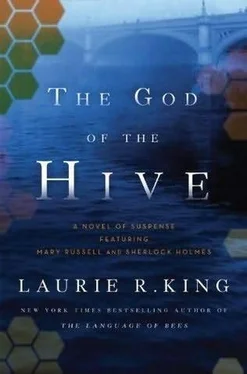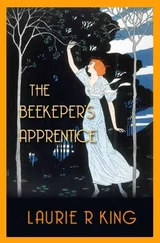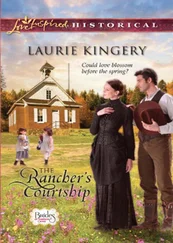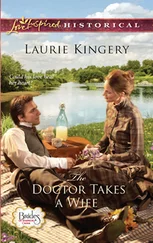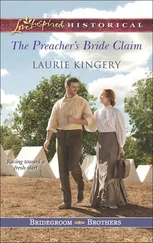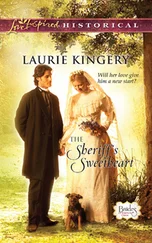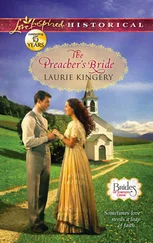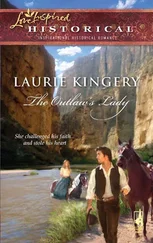He liked this young woman Mary Russell. If there were more like her in circulation, he might not have chosen to live quite so far out of the world. And such was his respect for her as a person, he thought that anyone she loved as much as she evidently had Mycroft Holmes might have been someone he, Robert Goodman, would have enjoyed.
So he was sympathetic, and sad for opportunities missed, but mostly he was curious. All sorts of currents swirled around the man’s death, each of them promising to wash in some interesting artefacts to the funeral.
His life had become far too simple. It had taken an aeroplane falling out of the sky to make him aware of his lapse into tedium. But now, everything had become exciting and vital and unpredictable, in ways that made him itch to contribute.
And now that he thought of it, he probably could come up with one or two ways to add his own touch to the afternoon’s obsequies.
Yes indeed; why not make the event something to remember, for all concerned? After all, who commanded that a funeral had to be funereal?
It was the least he could do for Miss Russell.
Russell had been here, in this bolt-hole, Holmes could see that.
But she had brought another person with her. To the bolt-hole. A man.
The clothing she had given the guest indicated he was small; the traces of hair in the razor said he was blond; his choices of reading material suggested either eclectic interests or easy boredom: Russell’s feminist Bible translation by Elizabeth Cady Stanton, a picture-book on the Venetian Mardi Gras, and a biography of Benjamin Franklin lay on the floor beside the chaise.
It was also clear that the man had spent some considerable time here on his own-or if not alone, he had felt free to paw through every corner of the place under Russell’s gaze. The man had even discovered the hidden cabinet, although he had not taken anything, merely re-stacking the gold coins into one teetering pile, and rearranging the eight valuable diamonds into what was perhaps meant to be an R .
Holmes very much looked forward to making the acquaintance of this small, blond, inquisitive man whom his wife trusted enough to leave unattended. Or, he corrected himself, whom his wife had brought here before she fell unconscious. And if that was the case, he looked forward to meeting the man all the more.
He returned the books to the shelf, locked the cabinet and restored the concealing volumes in front of it, scrupulously rinsed and dried the razor, and then began to dress in clothing suitable for the funeral of one’s only brother.
A song thrush sat atop a tree growing at the corner of a cemetery. It was a large tree, and an old cemetery. Generation upon generation of Londoners had been laid here, their bones dug up and re-buried, their lichen-spangled stones lifted and placed to one side like substantial ghosts lined up to bear witness.
The thrush had fed well that morning; the weak sun was welcome; its young were long gone from the year’s nest. He was happy to perch and cock a bright eye at the curious comings and goings below.
Earlier in the day, the grave-diggers had come with their spades, making their casual way across the lawns to the scheduled resting place of this newest graveyard resident. Their orders were for a larger hole than usual: Having an oversized coffin stuck halfway down was humiliating to professional pride, and affected the generosity of the families.
So their shovels scraped longer than usual in the heavy London soil, and the hole they dug was as outsized as the man it was to contain.
At last, they were finished. The man in the hole tossed out his spade and raised a hand for the others to pull him up. They arranged the cloth over the raw soil mound, gentling reality for the mourners, then propped their tools across their shoulders and went to seek out their luncheons.
Two hours passed, in silence but for the bells of nearby churches. The thrush came and went, came and went and returned. Clouds gathered, then cleared. Three families came to lay flowers on gravestones; a courting couple lingered under the trees; a pack of neighbouring children ran through, their raucous joy not, oddly, entirely out of place.
Then silence.
When the sun was halfway to the horizon, a man came, dressed in formal black, though wearing a soft hat. He stood for a time at the edge of the hole, then turned to survey the surrounding trees, stones, and marble tombs. He walked up and down, taking up a position behind a large granite cross, then beneath the song thrush’s tree, and finally stepped into the shadows beneath a grand family vault. The toes of his polished shoes caught the light, then they, too, retreated into the gloom. The man might not have been there at all.
The hearse that eventually came was the old-fashioned sort: high, black, and pulled by black horses with black feathered top-knots. The priest walked before, his black cassock peeping out from under a lace-trimmed white surplice, head bent beneath a Canterbury cap, prayer book in hand.
The coffin, both large and heavy, was taken from the hearse by six men. They settled it cautiously upon their shoulders, then stepped into an even pace, transferring the body to its eternal home.
Step; pause. Step; pause. Step.
Clouds grew across the sun, and the afternoon went dull. The mourners glanced upwards and fingered their umbrellas. A person looking on, from the high branches, perhaps, or a family vault, might have noticed how the people deferred to two or three of their fellows: Clearly these were important men, at a solemn occasion. Too solemn, too important for the jostling, bumptious press to have been notified.
The bird, back now, noticed primarily that there was no sign of a picnic luncheon.
The coffin approached, paused in the air, was lowered, and came to rest beside the hole. The six men stepped back, surreptitiously easing their shoulders. The priest stepped forward.
“I am the resurrection and the life, saith the Lord.” The ancient words of grief and comfort rose up from the circle. One woman, tall and buxom, raised a handkerchief underneath her black veil. One man, his hair sandy and thin, his black suit slightly out of date, swayed infinitesimally, then regained control. Another man, this one with the nose of a boxer and a tie too gaudy for the occasion, looked intently around the neighbouring area, seemed not to find what he was searching for, and then raised his arm to pass his hand slowly over his greased hair, a gesture so deliberate it might almost have been intended to convey meaning.
The thrush atop the overlooking tree noticed motion at a distance. Men, perhaps a dozen in all, had taken up positions in a wide circle around the oblivious mourners. Now they began to move forward. These were large, hard-looking men; two of them had bruised faces, as if they had recently walked into a tree, or a rock; one limped. Several sparrows flew out from another tree, but the song thrush remained.
Then came another wave of motion. This, too, came from all over, but it had many more than a dozen sources. Along the cemetery’s paths, over the low hill, from under the scattering of ancient trees, small groups of men and women converged on the hole and its coffin. The men wore dark suits, some ill-fitting; the women wore dresses appropriate to mourning. The women’s hair was of all colours and lengths; two of the men were bald beneath their hats. All the men were at least six feet tall, all were thin, all were at least forty years of age; the women were uniformly tall, all were slim, none was over forty.
And all of the women wore spectacles.
Quiet and to all appearances solemn, the men and women closed in to insinuate themselves among the twenty-three mourners already gathered at the grave-side. The original group looked at the oddly similar newcomers with expressions ranging from surprise to outrage, but the men and women were polite, quiet, and patient.
Читать дальше
